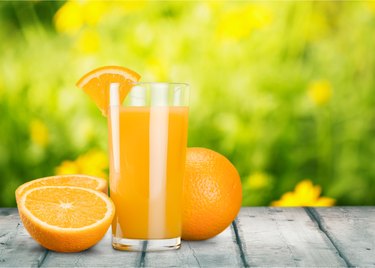
Many people do not enjoy drinking water and would rather drink juice to quench their thirst. Although juice is made from fruits, it is not a healthy choice because it does not contain the beneficial fiber found in fruits and can pack a lot of sugar, even if it is unsweetened. If you feel even thirstier after drinking juice, it may be a sign that you are still mildly dehydrated or that you are experiencing high blood sugar levels.
Still Dehydrated
Video of the Day
You can be dehydrated without knowing it, especially if the weather is very hot or humid, you have exercised at high intensity or have a fever. The symptoms of dehydration include thirst, a dry mouth, headaches and muscle cramping. If you have been in dehydrating conditions, having a small glass of juice may not be enough to replenish the fluids your body lost through sweating. You probably just need to take in more fluid to get back to your normal hydration level and totally quench your thirst.
Video of the Day
High Blood Sugar Levels
If dehydration is not likely to be the issue, your thirst after drinking juice could be due to high blood sugar levels, which is also called hyperglycemia. Unsweetened juice contains approximately 15 g of carbohydrates, or sugar, per 1/2 cup, which is the equivalent of a slice of bread. Most people drink over 2 cups at a time, totaling over 60 g of sugar, or the equivalent of four slices of bread. These numbers are higher for sweetened juices. If you have diabetes or are insulin-resistant, this could be enough to make your blood sugar levels peak quickly. If you also feel fatigued or are urinating more frequently than usual, in addition to being thirsty, it is very likely that your blood sugar levels are above 200 mg/dL, according to the Mayo Clinic. If you have a blood glucose meter, use it to confirm whether your blood sugar levels are elevated.
Other Foods
Even if you only drink a reasonable serving of juice -- no more than 1/2 cup -- your blood sugar levels could be high and causing you to feel thirsty because of other foods you may have consumed with your juice. For example, if you had juice with your breakfast, which may have also included cereal, bread, fruit, yogurt, pancakes and syrup, your total carbohydrate intake could be very high, pushing your blood sugar levels through the roof, according to the American Diabetes Association. Check your blood sugar levels, especially if you have diabetes, to establish whether there is a connection between your thirst and blood sugars.
Try Water
Fruit juice is not the healthiest option because the fiber of the fruit is removed and important nutrients are lost during processing. Opt for fresh fruits instead and quench your thirst with water, especially if you have trouble controlling your blood sugar levels. Water is the best way to get the hydration you need without the unnecessary calories and sugar. If you find water boring, jazz it up by adding a splash of lime juice. You can also try sugar-free sparkling water or herbal tea.